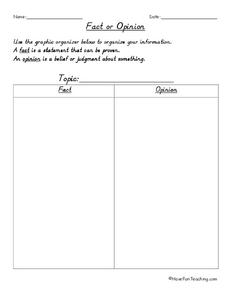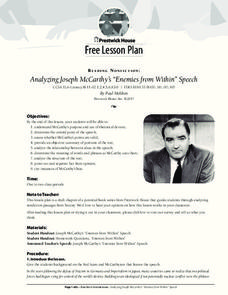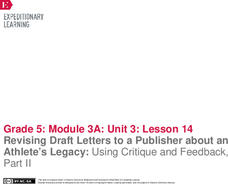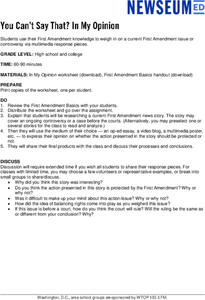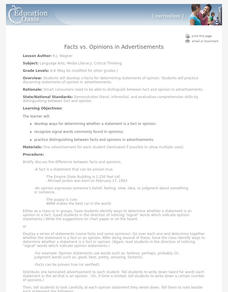Curated OER
Facts or Opinions - Wonderful Worms
Students watch a video about how the worm's value affects the environment and create a fact and opinion chart about it. In this fact and opinion lesson plan, students create a 2 column chart analyzing what is fact and what is opinion...
Curated OER
Fact or Opinion-Manatees
Students decipher factual information about manatees. In this biological science lesson, students research characteristics about manatees. They use that information to separate facts from common opinions about the animals. Students...
Curated OER
Comparing and Contrasting Information and Forming an Opinion - Santiago and Morris
Middle schoolers complete a T-Chart about a therapy dog and write a paragraph using the compare and contrast organizational structure. In this compare and contrast lesson, students discuss therapy dogs and complete a Morris T-Chart for a...
Curated OER
Opinions, Please!
Students discuss the meaning and purposes of polls and surveys. After reading an article, they analyze the results of a poll given to residents of New York City. They create a survey of their own and analyze the data to write a written...
Curated OER
Fact or Opinion
In this writing worksheet, students write facts and opinions about a given topic. Students use a graphic organizer to organize their information.
Curated OER
Opinion
An important concept for youngsters to learn is that there is a difference between facts and opinions. Use Kirsten Hall's Animal Touch to introduce the idea that an opinion is how one feels or thinks about something and that others are...
Curated OER
Form an Opinion Based on Facts
Explore fact and opinion through higher level thinking and literacy. Kids listen to the beginning of A Picture Book of Helen Keller by David A. Adler and identify facts in the text. They follow along as the teacher models how to form an...
Curated OER
Lesson 2: Distinguish Fact from Opinion in Books
An important part of reading informational text is being able to discern fact from opinion. The class reads chapter one from the book, Penguins by Lynn M. Stone. They analyze specific sections of the text to determine if what is being...
Curated OER
Identifying Opinions with Signal Words
First graders identify opinions within a text. In this language arts instructional activity, 1st graders discuss the definition of opinion. Students identify words that signal opinions and work together to identify opinions within the text.
Curated OER
Locating Facts and Opinions in a Newspaper
Fourth graders discuss the difference between fact and opinion. In this language arts instructional activity, 4th graders search the newspaper and identify factual articles and opinion based articles. Students discuss what makes the...
Curated OER
Identifying Facts and Forming Opinions
Kirsten Hall's animal books provide learners with an opportunity to practice forming statements of opinions and factual statements. Using sentence starters such as "I learned. . ." and "I think. . ." class members craft sentences cite a...
Curated OER
Distinguishing Facts from Opinions
Third graders use a scavenger hunt worksheet to look through classroom books and resources and identify facts and opinions. In this fact and opinion lesson plan, 3rd graders look through non fiction and fiction books.
EngageNY
Mid-Unit 3 Assessment, Part II: Organizing Notes for a Public Speech
It's all a matter of opinion! Pupils take Part II of the mid-unit assessment, in which they continue organizing their notes in preparation for writing an opinion speech. Using the resource, they add reasons, evidence, and a concluding...
Curated OER
Teaching Debate to ESL Students
Language learners use the debate format to practice formulating, expressing, and defending their ideas. Working in teams, class members develop resolutions, use opinion indicators to express their opinions and reasons, and prepare...
Prestwick House
Reading Nonfiction: Analyzing Joseph McCarthy's "Enemies from Within" Speech
Looking for a instructional activity that teaches class members how to analyze nonfiction? Use Joseph McCarthy's famous "Enemies from Within" speech as a instructional text. Worksheet questions direct readers' attention to the many...
DePaul University
Bold Plans, Big Dreams, City Progress
Determining which statements represent fact or the author's opinion in an integral part of reading informational text. Encourage seventh graders to read a passage about Barack Obama and the city of Chicago, as well as a passage focused...
EngageNY
Revising Draft Letters to a Publisher about an Athlete’s Legacy: Using Critique and Feedback, Part II
Let's get opinionated. Scholars participate in a peer critique and revision process using a fun activity called a Four Corners strategy. After incorporating classmates' feedback, individuals share their final drafts of their opinion...
Newseum
You Can’t Say That: In My Opinion
As a part of a study of the First Amendment, high schoolers research a current news story that seems to involve one of the freedoms granted by the First Amendment. Investigators decide whether they think the action presented in the story...
DePaul University
Seasons on the Prairie
Fact and opinion passages inform readers about the seasons on the prairie and Zambia in Southern Africa. Then, test scholar's knowledge with multiple choice and short answer questions.
EngageNY
Writing a Second Body Paragraph and Conclusion for an Opinion Essay: Jackie Robinson’s Role in the Civil Rights Movement (Promises to Keep, Pages 50–57)
Class members begin to work on the body paragraphs of their opinion essays about Jackie Robinson started in the previous lesson. They analyze a model paragraph and underline reasons for the opinion. Learners then take part in a mini...
EngageNY
Determining Author’s Opinions, Reasons, and Evidence: Signs of Hope and Progress for African Americans in the 1920s (Promises to Keep, Pages 14–15)
Caption this. Readers look at the text features in Promises to Keep and pay special attention to the photographs and captions before adding to the Features of Informational Text anchor chart. Learners then answer questions about life in...
EngageNY
Identifying Supporting Reasons and Evidence for an Opinion: Exploring Why Jackie Robinson Was the Right Man to Break the Color Barrier (Promises to Keep, Pages 26–29)
Breaking barriers is not an easy thing to do. Scholars read a section in Promises to Keep and summarize how Jackie Robinson broke the color barrier in baseball. They write the gist of the passage in their journals and then complete a...
EngageNY
Writing an Introduction and Body Paragraph That Support an Opinion: Jackie Robinson’s Role in the Civil Rights Movement
It is all in the introduction. Class members first learn to write an introduction paragraph and body paragraphs to support it. They then work to create a Criteria for Writing Opinion Essays anchor chart.
Curated OER
Facts vs. Opinions in Ads
Students develop criteria for determining statements of opinion. They practice discerning statements of opinions in advertisements.
Other popular searches
- Fact and Opinion
- Fact Opinion
- Fact Opinion Lesson Plans
- Fact or Opinion
- Fact vs. Opinion
- Fact and Opinion Passages
- Fact Opinion Worksheet
- Fact and Opinion Lessons
- Opinion Writing
- Teaching Fact vs. Opinion
- Fact vs Opinion
- Fact and Opinion Worksheets






